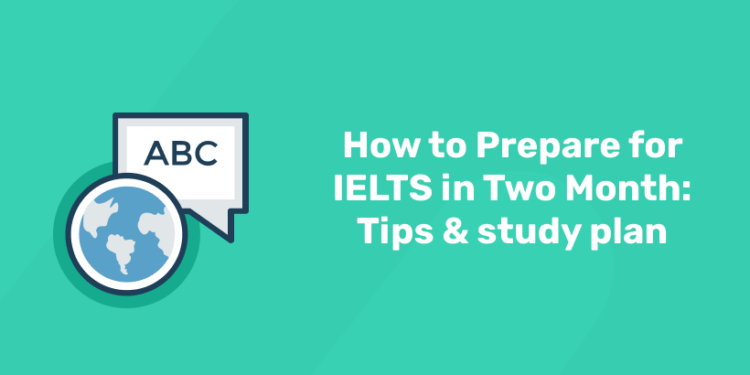Table of Contents
Making a study plan that increases your chances of success is necessary if you have less time and want to perform well on the IELTS. In this Article, we are going to discuss about how to prepare for IELTS in two months.
How to prepare for IELTS exam in two months: Study Plan
Week 1:
First week can be used to become familiar with the IELTS exam’s layout and structure.
It is strongly recommended that you take a practice test to decide your skills and drawbacks. Also, begin to develop your vocabulary right away because you cannot learn new words in just one day. Use flashcards or a vocabulary app to focus on expanding your vocabulary.
Week 2-3:
Give more attention to the listening portion of the exam. Take notes while hearing diverse English accents in lectures, podcasts, and newscasts. Read a variety of literature, including fiction, scholarly articles, and newspapers, as well as concentrate on enhancing your reading comprehension and speed. Use techniques like scanning and skimming to identify important information fast. Continue using flashcards to learn more new words every day.
Week 4-5:
Focus on the exam’s writing component. Write essays, letters, and reports on a timed basis for practice. Make sure to use the proper structure and format for each kind of writing assignment. Evaluate grammatical conventions and put them to use in your writing. Get writing-related feedback from a tutor or a native English speaker. Work on your English speaking skills with a companion or tutor. To find areas for growth, record yourself speaking and listen to the recording. Practice speaking examinations under time constraints, then go over your responses to find any mistakes. Enhance your vocabulary, pronunciation, and fluency.
Week 6-7:
Begin by taking two modules of a full-length practice test daily. You can mix reading with speaking, and listening with writing. In this way, you won’t get too tired, and the variety of portions will keep you away from getting bored. By now, you ought to have a sizable vocabulary, so put it to the test by applying it in your practice writing and speaking. Keep a running list of any new words you come across while practicing your reading.
Week 8:
Take at least two full-length practice exams to evaluate your progress. Spend some time improving the module that still needs some work based on the results. Instead of learning new words, concentrate on remembering the ones you have already learnt.
Tips and strategies to help you prepare for the IELTS exam
1: Most university students ........................ on campus in their first year.
Cracking the IELTS exam in just Two months needs a well-planned study schedule, consistency, and a strategic approach. Listed below are some tips and strategies to help you prepare for the IELTS exam and attain your desired score in just three months:
1. Know the test format
Understanding the test format is the first step to crack the IELTS exam. There are two types of IELTS tests – Academic and General Training. The Academic IELTS test is done for those who wish to study in an English-speaking country, while the General Training IELTS test is for those who want to work or migrate to an English-speaking country. Get familiar yourself with the test format and understand the sections, types of questions, and time limits. You can find this information on the official IELTS website or through IELTS preparation materials.
2. Create a study plan
Create a study plan and establish achievable goals. Make a schedule that covers all the topics of the test, including listening, reading, writing, and speaking. Allot time for each section based on your strengths and weaknesses. Divide the study plan into smaller tasks that you can attain within a day or a week. You can use a planner or a calendar to track your progress.
3. Build vocabulary
Building a strong vocabulary is essential to crack the IELTS test. Begin by learning the most commonly used words in English and gradually move on to more complex vocabulary. Use flashcards, read newspapers, and books, and practice using new words in your writing and speaking. Practice using the new vocabulary in your writing and speaking.
4. Improve your reading skills
The reading section of the IELTS test requires you to read and understand passages fast. To enhance your reading skills, practice reading a variety of texts such as academic articles, newspapers, and magazines. Glide through the text first, and then read it carefully to understand the meaning.
5. Practice listening
The listening section of the IELTS test can be challenging because of the various accents and the fast-paced conversation. To enhance your listening skills, listen to English podcasts, watch English TV shows and movies, and practice listening to conversations between native speakers.
6. Practice writing
The writing section of the IELTS test requires you to write essays and reports. Practice writing essays and reports on different topics, and get them evaluated by a teacher or an expert. This will help you identify your strengths and weaknesses and enhance your writing skills.
7. Practice speaking
The speaking section of the IELTS test requires you to speak fluently and correctly. Practice speaking English with a friend or teacher or join a language exchange program. Record your speaking and listen to yourself to identify areas where you need development.
8. Take mock tests
Taking mock tests is an excellent way to enhance your progress and identify areas where you need to progress. Take as many mock tests as possible, and try to simulate the test conditions as closely as possible. Evaluate your mistakes and learn from them.
9. Focus on grammar
Grammar plays a crucial role in the writing and speaking sections of the IELTS test. Therefore, it’s important to work on enhancing your grammar skills. Review English grammar rules, practice using them in your writing and speaking, and get feedback from a teacher or an expert.
10. Manage your time
Each section has a particular time limit, and you need to complete each section within that time limit. Therefore, it’s necessary to practice managing your time efficiently. You can do this by taking practice tests and working on your speed and accuracy. Identify the sections that take you more time and work on betterment of your speed. Make sure to allot time for reviewing your answers at the end of each section.
11. Use authentic materials
Using authentic materials such as past papers, official IELTS practice tests, and books can help you get familiar with the test format and the types of questions. Authentic materials can also provide you with a better understanding of the test structure and scoring criteria. Make sure to use recent authentic materials as the test format and content can change over time.
12. Stay motivated
Studying for the IELTS exam can be challenging, so it is important to stay motivated. Establish achievable goals, reward yourself when you reach them, and remind yourself of the reasons why you want to take the exam.
Ace Your IELTS Exam with Confidence!
Unlock your potential with our expert-led IELTS preparation course. Achieve your dream score and open doors to global opportunities!
Start Your IELTS Journey Today!Best Books for Preparation to Crack IELTS
You will need a good command of English and grammar rules. For this, we have prepared a list of books and other resources to go deep into your IELTS preparation.
1. IELTS Tutor Kit
The IELTS Tutor kit is prepared in a way to help non-English speaking students as well. The kit comes with a 40-minute CD along with a booklet for students to make the most out of it. The visual format of the content is quite unique, which helps the student to learn easily. The IELTS tutor kit also provides tips and suggestions which prove as a success for students.
2. Cambridge Practice Tests for IELTS 1
Cambridge Practice Test has 4 practice tests for the Academic module and reading and writing papers for the General Training. It also includes different question types and explanations with approaches for these questions.
3. The Cambridge IELTS Course Workbook
This book provides the students with insights and an introduction to the IELTS exam pattern that the students must be prepared for. The workbook provides practice material for the IELTS examination to prepare students for vocabulary, speaking tests, writing tasks etc. It is an apt material for self-study.
4. Step Up to IELTS Personal Study Book with Answers
This book will prepare you for all the skills needed for the IELTS exam. The book is for students who are at the intermediate level and find it challenging to prepare from high-level books. This book will prepare you for the Academic Training modules to maximize your band score. Each unit has a sample paper at the end for the practice of the students.
Conclusion
Cracking the IELTS exam in just two months is challenging but not impossible. With dedication, persistence, and the right strategies, you can achieve your desired score and open up a world of opportunities for yourself. By following the tips discussed in this article, you can make the most of your study time and effectively improve your language skills. Taking IELTS training will significantly enhance your chances of success in cracking the IELTS within two months!
IELTS Practice Tests
| IELTS listening practice test | Practice Now |
| IELTS writing practice test | Practice Now |
| IELTS reading practice | Practice Now |
| IELTS speaking practice test | Practice Now |









